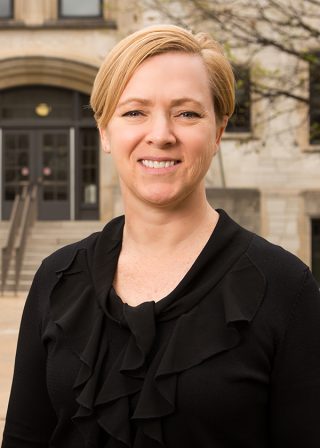Sabrina Trudo lives in a world of bright red tomatoes, brilliant orange carrots and yellow squash. And blueberries and eggplant.
The same chemical compounds that give fruits and vegetables their unique colors could influence our health, explains Trudo, an associate professor of human nutrition in the Dale Bumpers College of Agricultural, Food and Life Sciences.

Trudo is a registered dietitian who earned a doctorate in nutritional science. She holds the Twenty-First Century Endowed Chair in Human Environmental Sciences.
“The pigments, flavors, and odors in fruits and vegetables are often due to unique groups of naturally occurring compounds we call bioactives, which are not vitamins and minerals,” she said.
“When we consume them, they interact with our genes in interesting ways, such as having an antioxidant effect. If you eat just two fruits and vegetables in a single meal, you’re taking hundreds of different bioactives.”
These bioactives affect a variety of health factors, including weight, energy levels, immune system and others. But the foods we consume also inspire Trudo’s research into the link between obesity and certain cancers – especially in children.
Cancer Prevention
What we eat affects our genes, Trudo said, and what we know about that interaction could eventually lead to cancer prevention. “Obesity increases the risk of certain cancers,” she said. “I focus on specific categories of plant foods and how the things that are unique to them influence our genes and the body’s handling of cancer-causing elements. I want to find out if these plant foods work their way into those connecting mechanisms to decrease the risks of cancer.”
In the future, Trudo would like to incorporate virtual reality headsets to develop healthy behavior in children. There is some evidence that shows behavior within a virtual experience can translate into real life, she said, so it might be possible to steer a child’s brain to healthier choices and behaviors.
“What drives our choices is not just knowing what we should and shouldn’t do,” she said. “Thought processes in the brain are a lot more complex than that. With children, could we get ahead of the game in those thought processes and train the pathways in the brain toward making healthier choices? Training the brain to recognize earlier the consequences of a choice could only help people make healthier choices.”
Trudo, who holds the Twenty-First Century Endowed Chair in Human Environmental Sciences, is a registered dietitian who earned a doctorate in nutritional science. In addition to her lab research, she is passionate about increasing public awareness of a healthy diet. Arkansas has one of the highest adult obesity rates in the nation – more than 35 percent of the state’s population – and Trudo recommends following the 2015-2020 Dietary Guidelines for Americans, published by the U.S. Department of Health and Human Services and the U.S. Department of Agriculture, as a way to start promoting healthier lifestyles.





You must be logged in to post a comment.